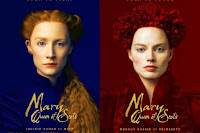The machinations of the British royal family eh? As it was 450 years ago so it is today. Someone is in favour and someone is on the wane. Someone thinks someone else should abdicate the throne. People who don't fit the bill are hounded out by a whispering campaign of the chattering classes. England and Scotland are uneasy bedfellows. Some things never change.
In the mid 16th century Elizabeth I sat on the English throne, the only remaining offspring of Henry VIII. Her distant cousin Mary sat on the Scottish throne, but claimed the throne of England too through her heritage to Henry VII. That was only a problem because Mary was a catholic and that was very important for some reason. What the courtiers of England really wanted was Elizabeth to birth an heir so they could put their eggs in this future basket and cast both women aside. But Elizabeth was having none of it, had no children and refused to name an heir. Eventually Mary gave birth to a boy who would unite the kingdoms as King James I of England / VI of Scotland, and then she was killed for the privilege. Spoiler alert.
When a creative force decides to retell a story that has been told a dozen times before in a dozen different ways, one expects there to be a reason for doing so. In this retelling of the intertwined lives of Mary and Elizabeth, the intention is to rebrand it as a struggle of women against the glass ceiling and male domination. Here - at its most basic level - Elizabeth succeeds because she shuns her own femininity and rules as a man; whereas Mary fails because she wants to rule as a woman, rather than in spite of it. Elizabeth refuses to make herself obsolete, as she would be in the eyes of her courtiers were she to create / name an heir. As soon as Mary has her son and heir, she is doomed - the men around her lose interest in pretending they're loyal to her, discarding her in favour of the male heir. The choice is clear; act like woman and be condemned for it, or act like a man and be commended for that too. This is an interesting slant for a contemporary audience familiar with such themes and how they play out in the modern work environment, where there are often vastly different behavioural expectations for men and women.
It is a shame then that the actual film feels incredibly flat. There are a number of directorial misteps that are scene-breaking. The worst being at the concluding meeting between the two queens. The space where they meet is draped with silk demi-curtains that cramp the space and get in the way of several shots. We spend a very long time with Mary, but far less with Elizabeth, an editing decision that gives Elizabeth much less sympathy than her distant cousin. It isn't clear if that was intended. If so then it's odd as this is meant to be about two woman each fighting in their own way to survive in a male-dominated world. Equal sympathy is deserved surely? The narrative occasionally jumps periods of time without it being completely clear why other than to maintain historical accuracy. Finally, there is a short battle sequence in act 2 that is mostly incomprehensible. What with all participants dressed in similar leather jerkins and slugging it out on a river bank it's messy to the point where I just wanted it to end so we could get on with the story.
Saoirse Ronan and Margot Robbie are great actresses. Ronan will be rewarded by the Academy eventually, but it was the film's make up and design that was fairly nominated at the 2019 Oscars. This isn't the only way it was edged out at those awards, since The Favourite was given awards for Olivier Coleman and nominated in multiple technical categories. That it went head-to-head with The Favourite is prescient and unfortunate, because it meant that not only was Mary Queen of Scots not the best period British monarchy film at the Oscars that year, it was also not the best period British monarchy film that specifically re-examined historical events through the lens of 21st century gender politics. The Favourite is more engaging scene-to-scene, is superbly-directed & lit, contains beautiful production design and costars Rachel Weisz - an actress too-often under-appreciated by the Academy who was righted nominated for her performance. I may not have been as blown away by The Favourite as I was hoping, but its treatment of this subject is a level above Mary Queen of Scots. Save for Ronan and Robbie themselves, I can't find many reasons to recommend this film. Watch The Favourite.
Tuesday, 11 February 2020
Subscribe to:
Comments (Atom)
